We might be living in the golden era of gay themed movies. The gay rights movement has come a long way in the past 25 years, and now with more people able to live LGBT lifestyles in comfort and peace than ever before, we're seeing more of them represented in films.
When we look at the history of how gay people and same-sex relationships are portrayed on screen, there's a whole wealth of great movies that have been released in the past couple of decades. They tell love stories that could never have been told before due to censorship and prejudice.
Just like with every other genre of cinema though, not every story is a romance, and not every tale ends well. Join us as we take a look through all the ups, downs, dramas, comedies, heartbreaks and triumphs of the fifty greatest gay themed movies that have ever been filmed!
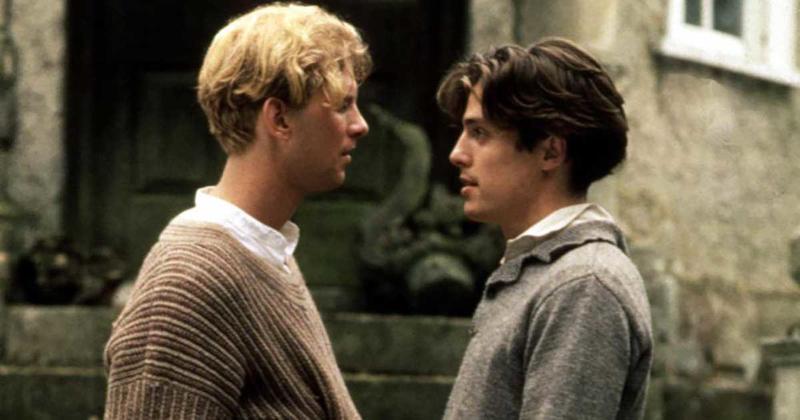
'Mambo Italiano' may be a comedy-drama movie, but the plot is actually based on a true story. The film was lovingly brought to life in 2003 by the skills of director Emile Gaudreault, but it started out as a stage play by Canadian writer Steve Galluccio and is the real-life tale of Gallucio's own experiences growing up on Toronto.

The thrust of the plot is that the central character Angelo, born to tough working-class Italian parents, moves out of home without getting married, which is a break with Italian traditions. His parents are shocked by this, but not as shocked as when he tells them he's gay. As he tries to deal with this, he must also provide support to his best friend Nino, who daren't come out himself out of fear of his mother's wrath.
This 2010 comedy drama was well received by critics and fans alike. It premiered to rave reviews at the Sundance festival, and then received a limited cinema release which was expanded when it became clear that audiences loved it. It went on to win Golden Globes for 'Best Picture,' with star Annette Bening winning the 'Best Actress' award at the same ceremony. Four Oscar nominations followed, although it wasn't able to pick up any trophies.
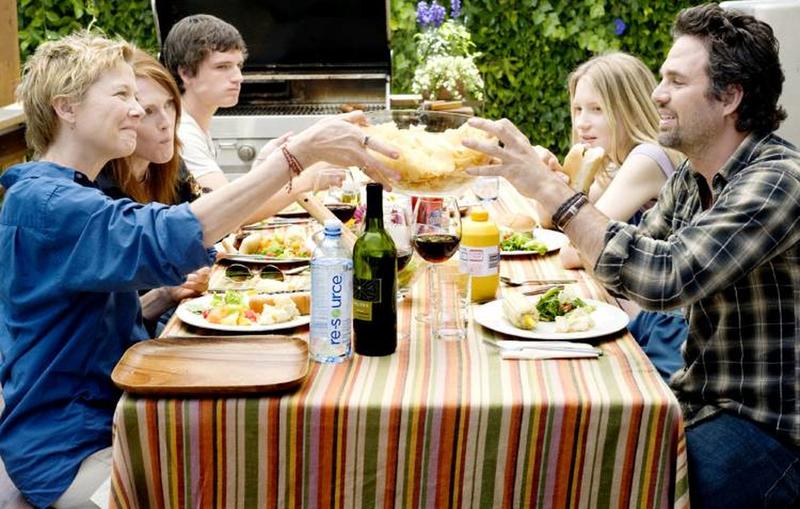
'The Kids Are All Right' was both written and directed by Lisa Cholodenko and depicts a same sex couple played by Bening and Julianne Moore raising their teenage children. The elder sister becomes curious and sets out in search of her biological father. There's joy when she finds him, but that quickly turns to despair when he has an affair with one of her mothers. With this being a comedy, all of these events lead on to hilarious consequences.
Even the most dedicated and avid film fans may be unaware of the cult classic 'And the Band Played On.' Made back in 1993 it was a pioneer of its genre, and as such, it struggled to get a full cinema release. It was released as a TV-movie, directed by Roger Spottiswoode and taking on the form of a docudrama. As with many other works on this list, it's based on a book; to give you an idea of the tone of the film, the book is called 'And They Played On: Politics, People and the AIDS Epidemic.'

HBO was the company bold enough to air it on television, and from there it was picked up for distribution by most major European countries. Ian McKellan, who rarely makes a bad film, is utterly compelling in his starring role, as are Matthew Modine and Alan Alda. The heavy-hitting subject matter is the discovery of AIDS, and the role that a prominent gay scientist played in breaking the news to a community who didn't want to hear it.
Comedy-dramas seem to be a popular vehicle for gay movies, and 2000's 'Big Eden' is no exception. The script was both written and directed by Thomas Bezucha and was especially well received at the gay and lesbian film festivals who got to see it prior to its mainstream release. The film picked up 'Best Limited Release Film' nomination from the GLAAD Media Awards, but didn't go home with the prize.

Montana is the setting for 'Big Eden,' and the entirety of the movie was filmed there with the exception of the opening sequence. Unusually for a gay film of this period, the plot doesn't deal with a gay character struggling either with their sexuality or with other people's acceptance of it; instead, it's about a gay artist who returns home to care for a sick relative and finds himself confronted with his childhood crush.
Add another one to the list of gay comedy dramas! 2013's 'G.B.F.' plays out like many other teen comedies of the era, with its high school setting and its occasionally juvenile humor, but it swaps the usual 'boy meets girl' storyline out for a story about popularity contests and being comfortable in your own skin.

The stars of the film are two best friends, Tanner and Brent, who are both gay and both in the closet. Tanner is outed, but quickly finds that he's accepted by all the 'cool girls' in school and sees his star rise in terms of how popular he is, while Brent stays in the closet and can only look on from the outside, becoming increasingly jealous as he slowly loses his best friend to all the best parties and social gatherings. This was one of the standout films from the 2013 Tribeca Film Festival.
You get extra 'film buff' points if you've ever seen this movie, or even heard of it. 'Hoje Eu Quero Voltar Sozinho' is a 2014 coming of age and coming out movie, produced and released in Brazil. It's an extension of a short film which was made four years earlier and picks up with the same characters later on in their adolescence, this time expanding the plot to cover the length of a feature film.

The title translates as 'Today I Want to Go Back Alone,' which is a reference to the short's title of 'I Don't Want to Go Back Alone.' There's an almost 'Brokeback Mountain' theme to the plot; two male friends who are desperately trying to pursue and maintain heterosexual relationships despite their obvious feelings for each other. It was a prize winner at the Berlin Film Festival, but sadly made back less than half of its budget at the box office.
2013's award-winning documentary movie 'Bridegroom' received some high-profile backing at the time of its launch; it was introduced at the 2013 Tribeca Film Festival by former US President Bill Clinton. Attracting plenty of mainstream publicity, it went on to win 'Best Documentary Film' at that year's festival and went on to be named joint-winner at the 2014 GLAAD Media Awards in the 'Outstanding Documentary' category.

The film is a stark and unflinching look at the reality of dealing with a same sex relationship in the eyes of the law, during a time when gay marriage was still illegal. It follows the real life of Shane Bitney Crone as he tries to come to terms with the tragic death of his partner of six years, Tom Bridegroom. Crone found that he had no legal protection or rights after Bridegroom passed away and was excluded from his lover's funeral by the family.
Here's a film that was light years ahead of its time; the quirky and unique 'My Beautiful Laundrette' is a British film that was released all the way back in 1985. Hanif Kureishi wrote the screenplay, and his is a unique vision of what life was like for gay people - and especially gay people from a minority background - in the conservative Britain of the time.

There are plenty of laughs to be had during the film, which also has the capacity to be both moving and touching as a street punk named Johnny finds himself setting up a laundrette business with his childhood friend Omar. Against all the odds, and in the most unlikely circumstances, they find themselves falling in love. Part drama and part social commentary, 'My Beautiful Laundrette' is a film like no other.
Director Ang Lee will always be most closely associated with 'Brokeback Mountain' when it comes to his contributions to the world of gay cinema, but it far from his first entry into the genre. He made 'The Wedding Banquet' back in 1993; an almost farcical comedy about both gay relations and race relations.

The plot revolves around a gay Taiwanese immigrant who finds himself forced into a marriage with a Chinese woman both to keep his homophobic parents happy, and also to secure his new wife a green card so she can stay in the country. Everything starts to unravel when, unexpectedly, his parents travel to the United States to help him arrange his wedding banquet, and he finds himself trapped inside a lie he can't possibly maintain. Winston Chao and May Chin take the lead roles in the film, which was made as an act of co-operation between the United States and Taiwan.
The cast of a movie will often tell you a lot about its qualities. 2004's 'A Home at The End of The World' boasts Colin Farrell, Sissy Spacek and a pre-'House of Cards' Robin Wright as its leading trifecta. Michael Cunningham wrote the screenplay, which likely wasn't an arduous task as he'd also written the original novel which the movie is based on, back in 1990.

The tale is a complex drama, with the two leading male characters awkwardly in a loose relationship together after the out-and-proud Jonathan seduces the less overly-gay Bobby while the two are still at school. Years later, the two move in with a bohemian woman named Clare, who embarks on a relationship with them both simultaneously. They try to make it as a threesome, sharing a house together, but tragedy and despair are hiding around the corner.
It may not be explicitly a gay film, but there are very few movies with as openly gay a tone as the cherished 1972 classic 'Cabaret,' featuring Liza Minnelli in the defining role of her career. Fittingly for a hit musical, 'Cabaret' was on Broadway long before it was on cinema schools, appearing on Broadway in 1966. The stage show wasn't the first iteration of the tale though; that would be the book 'The Berlin Stories,' a war novel first published in 1951.

Despite the showy centerpieces and all the singing, 'Cabaret' actually captures a dark era in German history, set in Berlin as the Nazis are taking their first strides towards power. While ostensibly about gay sexual relationships, many of which are depicted on screen, the film is really about the threat that Nazis presented to the personal freedoms of German citizens, and the shocking speed with which the public came to accept those views.
We're back into the romantic comedies now with this 1995 movie from director Christopher Ashley. Like some of the other great works we've seen so far, it started life as a play, based on the real life of Richard Jeffrey and written by Paul Rudnick. Rudnick was also involved in the movie, converting his work into a screenplay.

A young Ethan Phillips has a cameo in the film, as does Hollywood legend Sigourney Weaver, but it's Steven Weber in the lead role playing Jeffrey himself. Patrick Stewart also provides a memorable turn as an aging gay painter dealing with the recent loss of his partner to AIDS. The story is all about the AIDS crisis but is dealt with in a sensitive and humorous manner. In a climate of fear in the gay community as the threat of AIDS intensifies, Jeffrey must decide whether to hide from love, or accept it along with all the risks it entails.
1989's 'Longtime Companion' was a groundbreaking film; the first film dealing with the subject of AIDS to gain a full theatrical release. The title is taken from a headline that appeared in the New York Times, and was a description given to the deceased partner of a person living with AIDS who'd recently passed away.

Rather than focusing on just one person, the movie has an ensemble cast which deals with the discovery and then outbreak of the AIDS epidemic as seen through many people in the gay community at the time, showing how the impact of the disease affected not only gay couples, but also their friends and loved ones. A full decade elapses over the film's running time, meaning that we get to see both the short and long term effects of lost love and lost friends.
When the history of gay cinema comes to be written in full, the name of Sir Ian McKellan will be featured prominently. He appears here in 'Bent' as part of an all-star cast which also includes Clive Owen, Jude Law, and Rachel Weisz. Mick Jagger also makes an unexpected cameo appearance. Martin Sherman wrote the screenplay, which was an adaptation of his own book, which had the same title and was published in 1979. The film, with Sean Mathias in the director's chair, hit the big screen in 1997.

The film, made in collaboration by British and Japanese producers, is a dark and grim tale, dealing with the persecution of gay men in Nazi Germany, and the infamous 'Night of the Long Knives' in particular. The film's central character Max struggles to maintain the secrecy of his sexuality under the circumstances, which leads to him being dragged into unimaginable horror.
Staying with British-produced films for a moment, 'Priest' is another gay-themed movie from Britain, released in 1994. It was Antonia Bird's first-ever time in the director's chair, and she found herself tasked with doing justice to Jimmy McGovern's incredible screenplay. As the name suggests, the film is about a Roman Catholic priest who finds his faith put the ultimate test by a combination of circumstances.

Robert Carlyle of 'Trainspotting' and 'The Beach' fame is the perfect foil to Linus Roach's character of Father Greg Pilkington, who arrives in a small town pious and conservative, but finds himself attracted to Carlyle's character despite himself and doesn't know how to deal with it. Woven into all this is a parable about the Church's role in covering up abuse, making for a bleak viewing experience. It's sometimes difficult to watch, but it's a story that feels like it had to be told.
'Hedwig and the Angry Inch' is a movie that enjoys a huge cult following. Although it was made nearly twenty years ago in 2001, it still has the capacity to shock and amaze just as much as it did when it was brand new. This is an intentionally over-the-top comedy drama delivered in the shape of a musical, all set in the world of German glam-rock.

The titular Hedwig is the lead singer of an East German rock band, whose 'angry inch' is the result of a botched vaginoplasty. The idea of the operation was to allow him to escape the oppressive conditions of East Germany and run away to America with his partner, but he's dumped abruptly after the operation fails. He finds solace in the arms of another man named Tommy, only to wake up one day to find that Tommy has left and stolen all of his music.
Despite the setting and the subtext for this 2002 Israeli-produced movie, it somehow manages to work as a romantic drama. Yossi & Jagger are both Israeli soldiers, posted to one of the most dangerous front lines in the world at Lebanon's border. The toll of warfare rests heavily on both of the young men, who find themselves turning to each other for comfort despite their conservative upbringings.

Because of the subject matter, the Israeli army refused to offer any support to the film when it was in production. It was only when it was released to positive views that they relented, and they went on to have it privately screened at military bases. As one might expect from what is essentially a wartime romance, there's an air of tragedy hanging heavily across the whole script. The movie took a while to win over the public but was ultimately so successful that it spawned a sequel in 2012.
Director Jamie Babbit took to the big chair for the first time to bring us 1999's 'But I'm a Cheerleader,' which operates in three separate genres at the same time; satire, romance, and comedy. Natasha Lyonne is the titular cheerleader, the most popular girl in her high school who just happens to be a lesbian. Her parents are unwilling to accept this, and so they send her away for the summer to a 'conversion center.'

At the conversion center, which is euphemistically referred to as a 'therapy camp,' she meets a whole raft of characters who are very much determined to do anything apart from stop being gay. Instead, the experience re-enforces her convictions and leads to her falling in love. Look out for both Clea Duvall and RuPaul putting in star turns as her camp-mates.
'I Love You Phillip Morris' is an unlikely film in a number of different ways. Released in 2009 it represents a break from the norm for Jim Carrey, who at the time was almost exclusively known for his over-the-top comedy performances. This is still a comedy, but one with a lot of heart, telling the tale of a romance between him and Ewan McGregor's character, the 'Phillip Morris' of the title.

More unlikely than Carrey's sincere performance is the fact that this is a true story, telling the real-life tale of the serial fraudster Steven Jay Russell, who was incarcerated several times during the 1980s and 1990s, but frequently managed to find a way to escape. On one of his prison stays he unexpectedly falls in love with Morris, his fellow inmate. That's the reason he's so keen to keep escaping in future, and it's also the source of much of the movie's humor.
You don't come across many movies that feel obliged to include their genre along with their title, but that's the route that this year 2000 movie has gone for. It's a semi-autobiographical tale from Greg Berlanti, who also directed the film, which means it's one man's vision. All of the characters are loosely based on himself and his friends, and their lives as a small gay community in West Hollywood.

What makes this film stand out for its time is that it didn't make the homosexuality of its characters into the source of the drama or the comedy. Their homosexuality is presented as normally as heterosexuality is in other films, with the characters shown to be perfectly normal people who just happen to be gay. While this may not be unusual as we approach the 2020s, it was in 2000. With Zach Braff from 'Scrubs' in the central role, this is almost 'Friends' re-imagined as a gay comedy.
We've seen a lot of novels turned into films so far in this list, and this is another. The American-produced 2013 comedy-drama 'Geography Club' is based on an original text by Brent Hartinger, brought to life for the big screen by the twin-brother writing and directing team of Edmund and Gary Entin.

As with 'But I'm a Cheerleader,' this all takes place in a high school, and is about a stereotypical jock character not doing what stereotypical jocks are supposed to do. The school's star football quarterback Kevin is wanted by every girl in school, but he's secretly in a relationship with Russell, who helps him with his heterosexual pretenses by also going on dates with girls himself. As they meet other gay characters inside the school, they form a 'Geography Club' so they can be themselves in peace, thinking nobody else would be interested in joining such a society. They were wrong.
We told you that you'd see the name 'Ian McKellan' again and again in this list, and 'Gods and Monsters' is his third appearance so far. It's also arguably the most dramatic and prestigious of the three. 'Gods and Monsters' is a biography of movie director James Whale, and follows him during his final years.

Whale was a complex character in real life, never truly recovering from his experiences serving for the military in the First World War. McKellan is helped out immeasurably by the performances of co-stars Brendan Fraser and Lynn Redgrave. Bill Condon served as director, and legendary British horror writer Clive Barker was a surprising choice to assist as the executive producer. Given the quality of both the script and the cast, nobody was surprised to see it take home the Oscar for 'Best Adapted Screenplay,' along with nominations for 'Best Actor' and 'Best Actress in a Supporting Role.'
There's a lot going on in 2008's ambitious movie 'Were the World Mine.' The film tries to be a fantasy, a romance and a musical all at the same time, while loosely re-telling the classic Shakespeare tale 'A Midsummer Night's Dream' and simultaneously adjusting the story to fit the narrative of gay empowerment. By trying to do everything at the same time the film is constantly on the precipice of disaster, but it somehow manages to pull it off.

The film sees Tanner Cohen's character of Timothy struggling with his sexuality while living at an exclusive private boarding school. He's in love with the captain of the rugby team, who does nothing but belittle him for his sexuality. While rehearsing for his part in a school production of 'A Midsummer Night's Dream,' he finds the recipe for a powerful love potion and unleashes it on the town, causing previously heterosexual people to take on new same-sex partners, with consequences that vary from the amusing to the appalling.
2006's 'Shortbus' courted a lot of controversy at the time it was released and is still shocking to many audiences today. John Cameron Mitchell's plot is inspired by real-life gay gatherings in the vibrant New York City party scene, which often descended into chemically enhanced orgies

Mitchell took the decision to approach his subject matter with authenticity and realism. That meant the movies contains explicit sex scenes which were deemed too graphic for cinema, including unsimulated sex, ejaculation, and penetration. The director justified his artistic choices by saying that porn doesn't do justice to the cinematic quality of sex. As you'd expect from such a movie, there isn't one central character in the plot, with the film instead following a number of colorful characters who find themselves drawn to this underworld party scene, often trying to plug a hole in their lives.
Keanu Reeves puts paid to the idea that he's a limited or one-dimensional actor here, a mere two years after he gained that reputation from 'Bill and Ted's Excellent Adventure.' 'My Own Private Idaho' is the kind of film that independent cinema exists for and was far ahead of its time when it was released in 1991.

Gus Vant Sant brought us this movie, which is another case of Shakespeare's classic texts being borrowed; this time it's 'Henry IV Part 1'. It's a gritty tale which focuses on male prostitutes trying to make a better life for themselves while refusing to recognize their own sexuality, considering it to be a profession more than an orientation. Bringing it to the screen was almost a lifetime of work for Van Sant; he wrote the original screenplay during the 1970s. He had to completely re-write it after reading a John Rechy novel named 'City of Night' and discovering he'd accidentally plagiarized part of it.
We've seen a couple of takes on gay tales that come from outside of the US and Britain already, and in 'Summer Storm' we now have one from Germany. The 2004 film fits into the 'coming of age' genre and is comedy drama based around events at a rowing regatta which take a turn for the unexpected.

A team of very-heterosexual German rowers is excited to be heading for the regatta because they'll be sharing a camping space with an all-female rowing team, only to find out when they arrive that the girls have canceled, and an all-gay team has taken their place. There are tensions between the two teams of boys, but in the midst of that tension, one of the straight boys is about to make a life changing discovery about himself. The central message of the film is about finding comfort in who you are and having the confidence to say it out loud.
We're staying in Europe for this next movie, which is a Dutch production that hit its national cinemas in 2014. Like 'Summer Storm,' 'Jongens' is a coming-of-age drama. The title literally translates into English as 'Boys.' The movie also shares some elements of theming with 'Summer Storm,' in that there's a sporting competition acting as the background for the drama.

As we've seen in other films - and with young men on sports teams in reality - there's enormous peer pressure to be seen as alpha males, chasing after girls and acting in a stereotypically heterosexual manner. Despite that, two of the boys on the team are slowly becoming aware that they have feelings for each other and have no idea how to approach them. A voyage of self-discovery awaits. The movie struggled to even gain a cinema release in the Netherlands at first, but finally made it there after a successful screening on a television channel before being exported to wider Europe.
It may seem odd to present a story about a transsexual person coming to terms with their identity as a comedy-drama, but often humor is the best way to approach a sensitive subject. 'Transamerica' acts as evidence to that point; even the title is a play on words, referencing both the trans community in the United States and the idea of journeying across it. Accordingly, this is a road-trip movie, with transgender woman Bree taking a trip across the nation with her long-lost son Toby, looking to find a connection with him

Felicity Huffman stars as Bree, which is a significant departure from her famous 'Desperate Housewives' role. In a scenario that Caitlin Jenner could probably sympathize with, she's struggling to reconcile being transgender with being conservative; and that's before her troubled son re-appears in her life. Both of them have significant obstacles to overcome in order to maintain a relationship.
1998's 'Edge of Seventeen' is yet another coming-of-age comedy drama, directed by David Moreton and also written by Moreton in conjunction with Todd Stephens. The film may have been made in the 1990s, but it's set in the 1980s, and features a central character named Eric, who uses the androgyny of Eurythmics singer Annie Lennox as an inspiration for coming to terms with his own sexuality.

It's a rough road for Eric, who has to deal with all the uncomfortable 'firsts' that teenagers experience while in their formative years, including a regrettable sexual experience and an upsetting case of crossed wires with his female best friend which leaves a mark on both of them. The musically gifted Eric has a career waiting for him in New York, if he can only figure himself out enough to get on with it.
Released in the same year as 'Edge of Seventeen,' 'Get Real' is a grittier take on what it means to be a gay young man trying to come out into a world that isn't necessarily ready to accept him. It's a British movie, set in the conservative British town of Basingstoke.

Simon Shore directed the movie, with Patrick Wilde providing the script by loosely adapting his own novel 'What's Wrong with Angry?', published six years earlier. Central character Steven Carter is sometimes difficult to like; his fearful closeted nature leads to him having ill-advised sexual encounters in public toilets and destroying the life of a friend who comes out to him in order to avoid other people suspecting him of being gay. The title 'Get Real' is a reference to being honest about your own identity, but for Carter, that's always an objective that's too far out of reach.
Despite the title, 1988's 'Torch Song Trilogy' is, in fact, a single film. Harvey Fierstein wrote the play that the film is based on, adapted it into a screenplay and also starred in it himself, sharing the screen with Matthew Broderick in one of his early roles.

Although the movie isn't biographical, Fierstein was keen to emulate the work of Charles Pierce, a female impersonator best known for his impressions of Bette Davis in the 1960s and 70s. It's an artistic production which follows the main character of Arnold through ten years of his eventful life and had to be truncated heavily to make it to the big screen. The original play was an epic that ran to four hours; the movie was permitted a maximum length of two by its studio, and so the timeframe was constrained, and several characters were written out entirely. Broderick nearly missed out on the role due to a car accident but decided to accept the part when rehearsals had already begun with a different actor.
Directed by Jim Fall and written by Jason Schafer, the independent movie 'Trick' was released in 1999 with a premiere at the prestigious Sundance Film Festival, going on to attain a full cinema release in the July of that year. It's a gay romantic comedy that stars Christian Campbell and John Paul Pitoc in the lead roles, with Tori Spelling providing strong backup.

The plot of the film all happens over the course of one evening, in which the two main lead characters meet in a gay bar and decide to head home for a one-night stand, only for everybody and everything to get in their way. Their search for a brief liaison is a fruitless one, but they ultimately end up developing a more profound connection because of it. Bizarrely, several reviews at the time picked up on an apparent Doris Day movie feel running through the film.
As we approach the upper third of this list, we're coming across movies that have huge reputations and armfuls of awards. 'Boys Don't Cry' definitely fits that bill. Released in 1999, it's ostensibly an independent film but has a blockbuster profile, ultimately being picked up by Fox and distributed to all major cinemas.
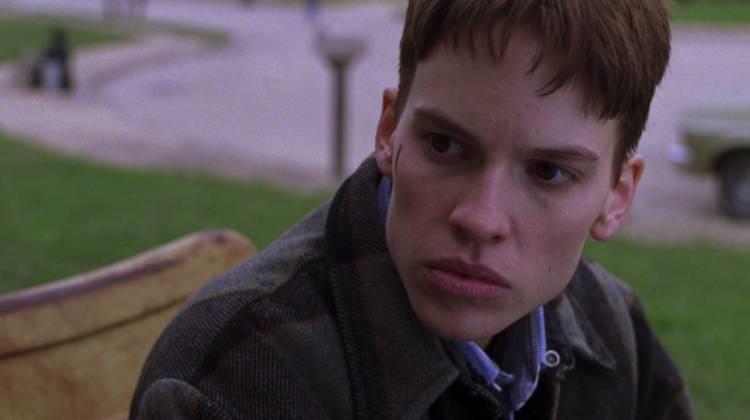
'Boys Don't Cry,' as so many gay-themed films are, is based on true events. Hilary Swank is riveting as Brandon Teena, who ultimately pays for the search for her real gender identity with her own life after the men in her life refuse to accept her for who she is. The sad and beautiful movie tackles the tragedy of Teena's life head on, linking the personal tragedy with broader themes of empowerment, freedom and the right to live without judgment. Swank went on to collect the 'Best Actress' Oscar for her performance.
A rare example of Dutch and American filmmakers working together, 2004's 'Mysterious Skin' is a straight-up drama that comes from a book, also called 'Mysterious Skin' and published in 1996. Gregg Araki loved the novel, wrote the screenplay and went on to direct the film. It took a while for distributors to pick it up; although it earned strong reviews at the Venice International Film Festival, it didn't actually receive full distribution to cinemas until the following year.
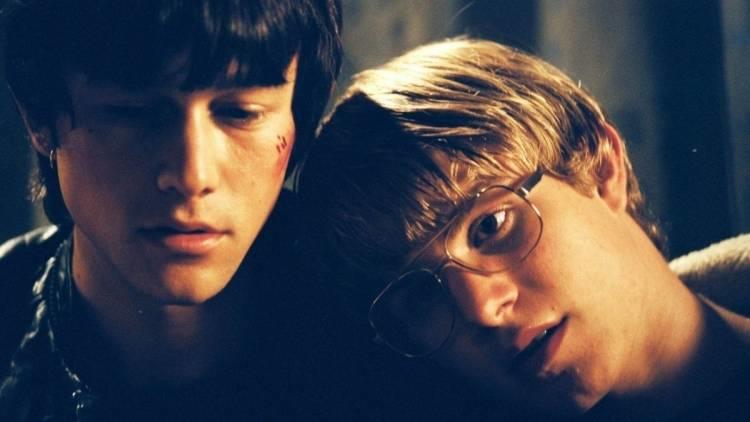
Joseph Gordon-Levitt's acting qualities were on full display in this film, telling the miserable tale of two young teenage boys who are abused by a baseball coach. Each of them responds to the abuse in a different way; one of them convinces himself he's both gay and worthless and becomes a hustler, and the other psychologically detaches from reality, becoming a paranoid conspiracy theorist.
This 2009 made-for-TV film is a genuinely upsetting, heartbreaking watch. It's the recounting of the true story of a mother coming to terms with the suicide of her son, who took his own life partially because she wouldn't accept his sexual identity. It's based on a book of the same name, which was written by Leroy F. Aarons on behalf of the mother of Bobby Griffith. In other words, it's the tale of a real woman coming to terms with her own role in her son's death.
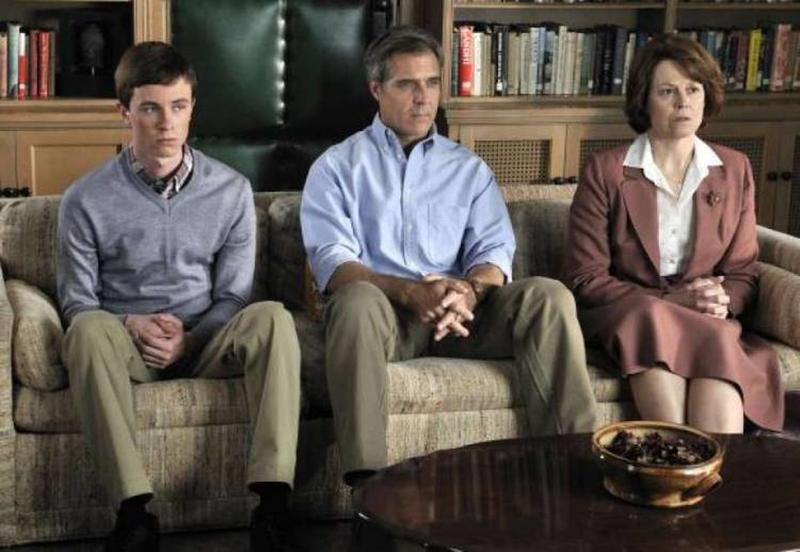
Ryan Kelley is in the lead role playing Griffith, with Sigourney Weaver taking on the part of Bobby's mother. On its broadcast, it received two Emmy nominations, with Weaver also being nominated for a 2010 Golden Globe for Best Actress. Such is the power of the film that it was screened at the headquarters of the European Union on International Homophobia Day.
The most recent movie on this list, 'Love, Simon' was only released in 2018 but has already made a considerable impact on the LGBT community. The plot sounds like familiar ground; it's another romantic teen-comedy with most of the laughs being at the expense of a closeted boy who doesn't feel ready to come out, but it has a twist.
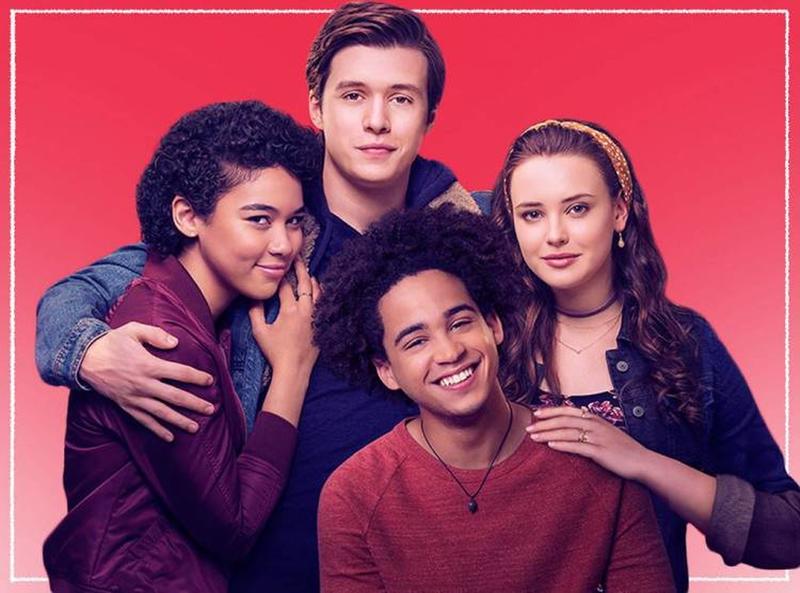
Nick Robinson's main character is trying to solve a mystery; someone at his school is communicating with him online and has told him that they're in love with him. All he needs to do is track them down. At the same time, someone's trying to blackmail him about his sexuality. Could the same person be responsible for both the affection and the trauma? 'Love Simon' is the first movie by a big Hollywood movie company to have a gay romance as a centerpiece. We're still having 'firsts,' even in this day and age.
This is the movie with the longest name on our list, so we'll shorten it to 'To Wong Foo' for practical reasons. Released in 1995, this comedy has an all-star trio of men in the lead roles; namely Patrick Swayze, Wesley Snipes, and John Leguizamo. All three are playing against their usual roles as macho men; they're drag queens, embarking on a wild and wacky road trip which is all about a signed picture of Julie Newmar. As absurd premises for a movie go, that has to be somewhere toward the top.
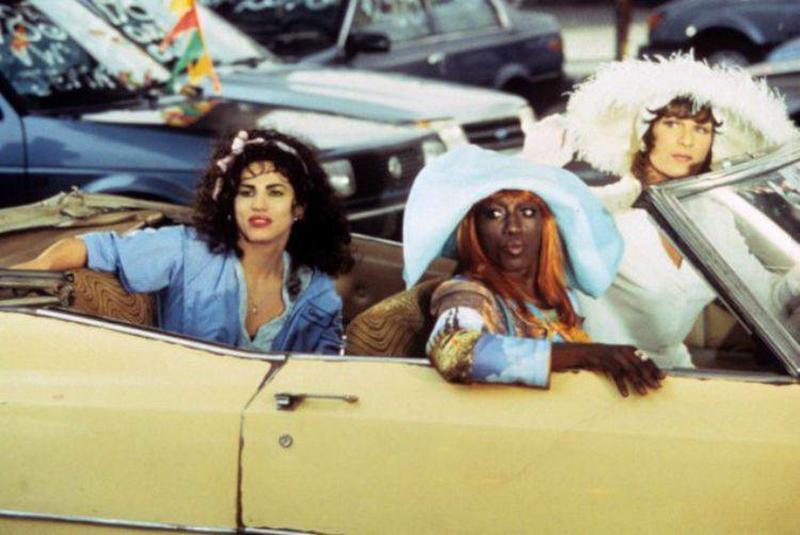
There are a lot of fun cameos in this film, including Julie Newmar herself, as well as RuPaul and Stockard Channing. The road trip takes an unscheduled diversion when the three drag artists find themselves stuck in a backwater town, but while there they're forced to confront their own identities and insecurities.
When you hear 'British period drama,' two of the first names you're likely to think of are Hugh Grant and Helena Bonham Carter, and both of them are here in Maurice. Released in 1987, this is several years before Grant would become well-known (and somewhat typecast) for his performance in the global hit 'Four Weddings and a Funeral.'
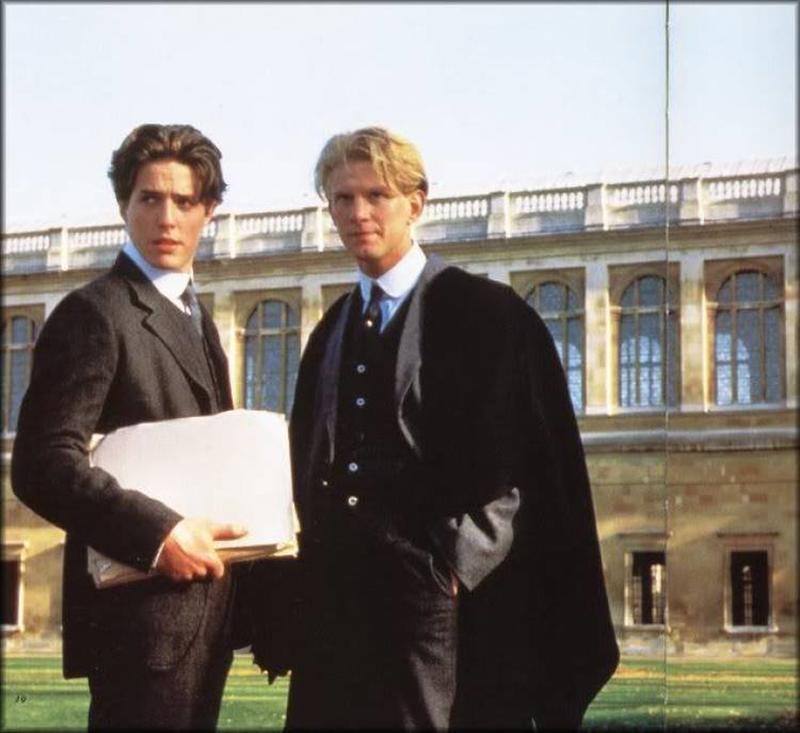
This is a classic tale, based on the work of novelist E. M. Forster, and recounting a story of illicit and forbidden gay love in England during the early years of the 20th century. Grant plays central character Maurice Hall over many years of his life, taking him from his formative years at school to the day he meets and falls in love with the man he's destined to spend his life with. So scandalous was the original novel when it was written in 1914 that Forster left explicit instructions that it wasn't to be published until after his death!
British romantic drama 'Weekend' was never intended to reach mainstream cinemas at all. Shot on a shoestring budget, it premiered to rapturous applause at the 2011 SXSW festival in the USA, and on the basis of that, it was decided that it would receive a limited cinema run. It was a good decision; it went on to make more than ten times its budget at the box office.
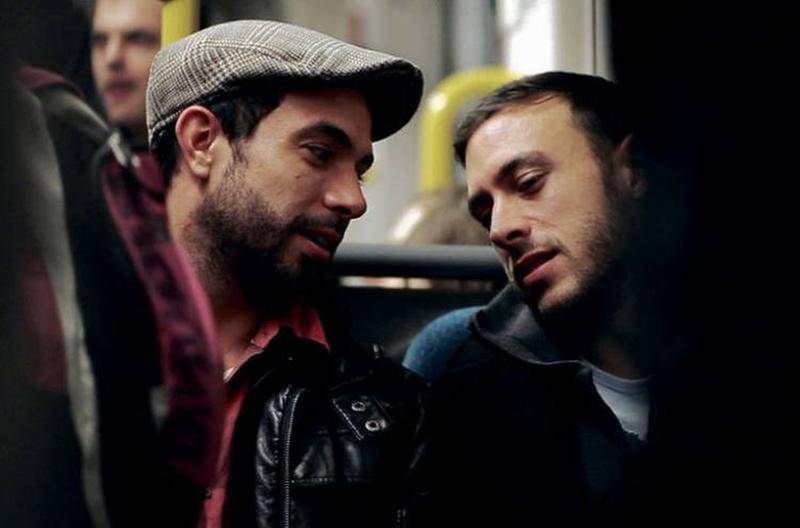
It's an understated story delivered with sincere emotion and unflinching reality; two men who meet and fall in love, completely in the knowledge that their time is limited by circumstance. One of them has to leave the country, and there's nothing that can be done to stop it. The film serves as a reminder that love isn't necessarily limited by time or by circumstance, and it can, in fact, be intensified when one or both factors are limited.
If you've never come across 'Philadelphia' before, please accept our congratulations on finally escaping from beneath the rock you've presumably been living under! The iconic and fantastic 'Philadelphia' stars Tom Hanks in one of the best of all his epic big-screen performances, winning Best Actor at the Oscars.
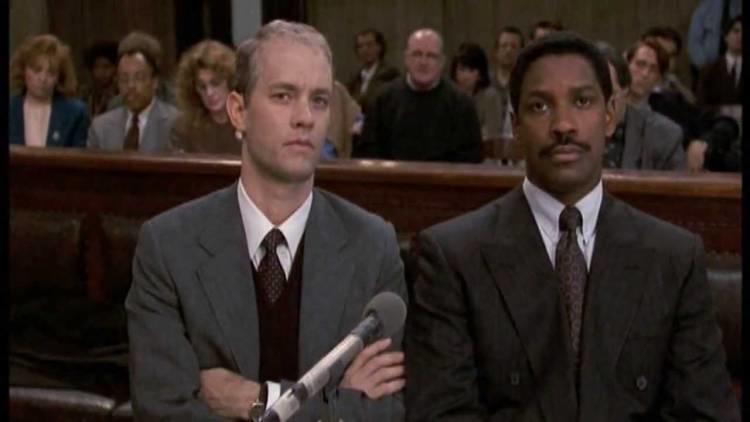
Released in 1993, this was one of the very first properly funded and supported Hollywood productions to openly discuss and examine the issues of HIV and AIDS in America, as well as the culture of homophobia which both mocked sufferers and suppressed gay rights as a response to the epidemic beginning. The tear-jerking film follows Hanks' character as he attempts to sue the law firm he once worked for, who dismissed him on the grounds that he was gay and had AIDS, and rigged paperwork to give them an excuse to dismiss him. If you're going to watch it, have tissues ready.
This movie may have done as much for the cinematic depiction of Australians and Australia as it did for the representation of gay people. Released in 1994, this is a riotous comedy-drama which follows a transsexual woman and two drag queens as they journey across the outback of Australia. Guy Pearce, Terence Stamp, and Hugo Weaving clearly have a lot of fun with their starring roles.
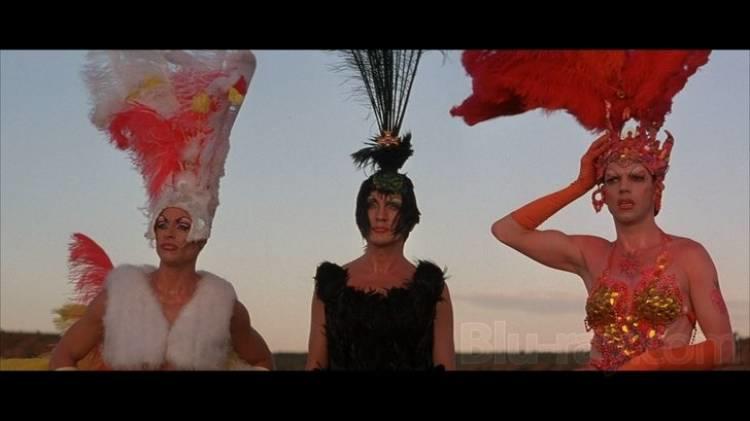
The 'Priscilla' of the title is actually the trio's tour bus, which isn't the only part of the movie's name that plays with words. In many English-speaking countries - Britain and Australia being two - a 'queen' is a slang term meaning a homosexual man; especially one who cross dresses. Part road movie and part farcical comedy, this is all about the adventures of the three leads as they encounter all manner of people and parties on their travels. All three LGBT characters are portrayed in a positive light, which was far from a guarantee in the movies of the time.
Once seen, 1992's 'The Crying Game' is never forgotten. It's a drama movie that doesn't flinch from tackling gay issues head on, but also manages to confront issues affecting race, gender and nationality at the same time, without ever feeling bloated or coming across as a sermon. As if all those topics weren't enough, the film is set at the peak of the Irish 'Troubles', when relations between Britain and Ireland were at an all-time low.
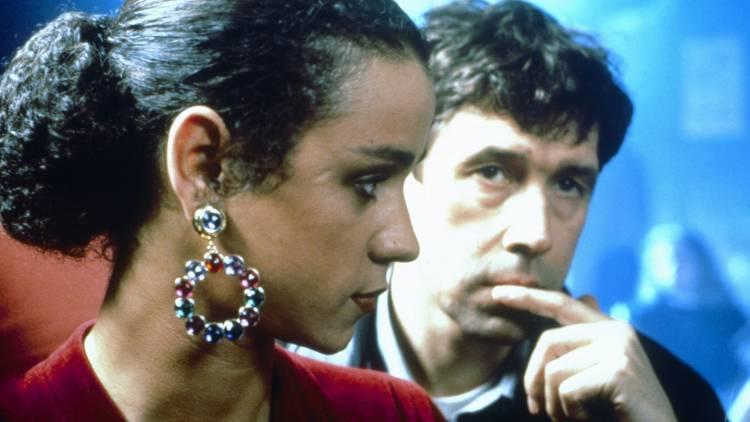
Neil Jordan's script sees IRA 'soldier' Fergus have an unexpected romantic encounter with Jody, a prisoner of the group. As part of his promise to Jody that he would protect his girlfriend Dil, he also goes on to have a regrettable relationship with her. Conflicted between who he is and what he believes he should be, Fergus has to make a choice that will define him. In 1999, this was voted the 26th best British movie of all time, as well as receiving an Oscar for 'Best Original Screenplay.'
From the dark and tragic world of 'The Crying Game,' we move on to the frantic and fabulous 1996 comedy 'The Birdcage.' This is an American production, but it isn't an American original; it's an English-language remake of the 1970's French-Italian movie 'La Cage aux Folles', but this version is far better known around the world, not least because of its incredible cast of performers.
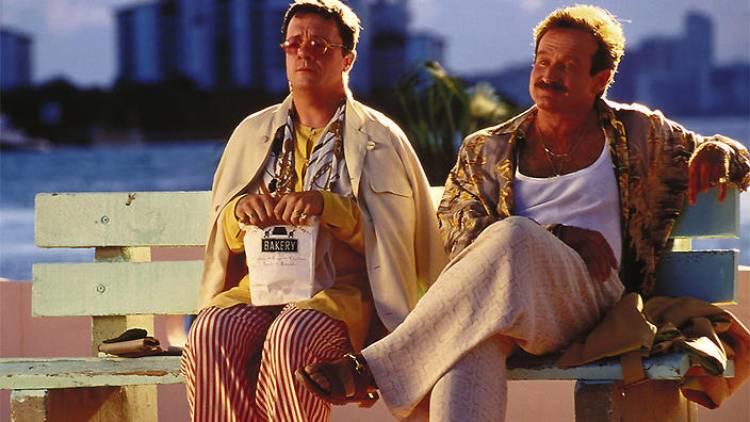
Robin Williams gives one of his best-ever performances in the lead role, backed ably by Dianne Wiest, Nathan Lane, Hank Azaria, and Calista Flockhart among others. Those 'others' include Gene Hackman, who appears to be having the time of his life as he performs one scene in full drag. The film is intentionally camp and plays out as a farce, with entertainment guaranteed. It was a smash-hit at the box office and received acclaim from GLAAD for portraying gay characters in a positive light.
It can sometimes sound cliched to describe a film as being 'important,' but 'Milk' is an important movie, and there's no better way to describe it. As a frank and factual retelling of pivotal moments in the history of America's gay rights movement, it's never been bested by any other movie before or since. That's why it picked up two Oscars, namely 'Best Actor' for Sean Penn, and 'Best Original Screenplay' for writer Dustin Lance Black.
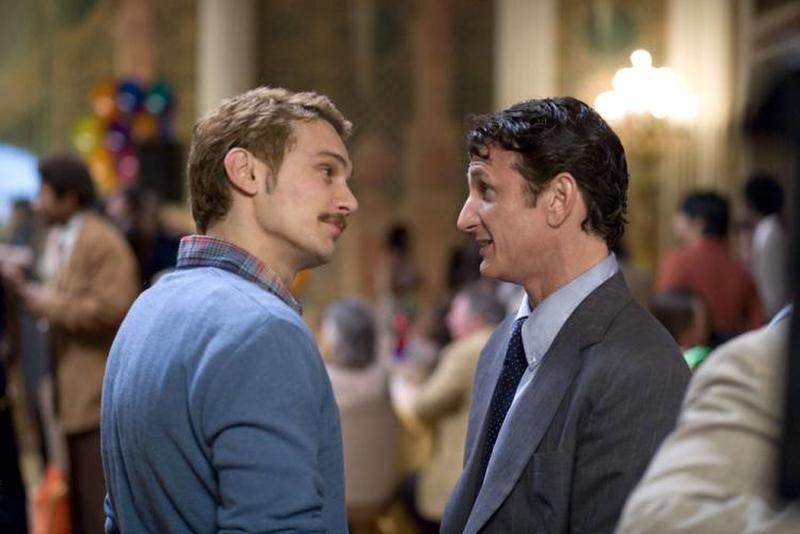
If you're unfamiliar with the tale, 'Milk' is a biographical film about the life of politician Harvey Milk, who became the first openly gay person ever to be elected to office in California, where he served on the San Francisco Board of Supervisors. Penn completely vanishes into his role as Milk, imbuing the character with a deep humanity and tenderness, which makes his ultimate end all the more tragic to see.
A relationship between a Mormon missionary in denial about his homosexuality and an openly gay man who lives next door sounds more like a drama than it does a comedy, but the story is played out for laughs in this romantic comedy from 2003. Joseph Gordon-Levitt is present in one of his smaller early film roles, but the bulk of the action goes to the leading pair of Steve Sandvoss and Wes Ramsey.
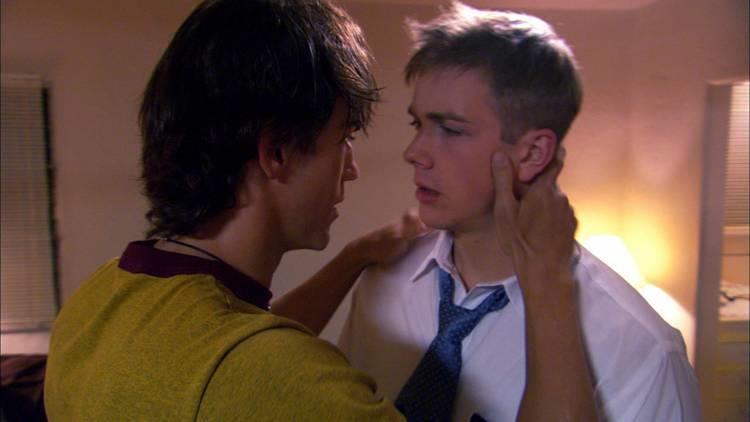
As we've seen with many other gay-themed films, this movie initially struggled to achieve distribution to cinemas. It couldn't even find a place at a mainstream film festival, premiering instead at the Philadelphia Gay and Lesbian film festival in 2003 and slowly growing in reputation from there. It slowly made its way into American cinemas territory by territory over the course of the following year, and then out into the wider world.
'Beautiful Thing' is a low budget British movie from 1996, made for television by the terrestrial TV station Channel 4. It's a further example of great gay plays being turned into great gay films; in this case, Jonathan Harvey wrote both the play and the screenplay, but turned the director's chair over to Hettie MacDonald.
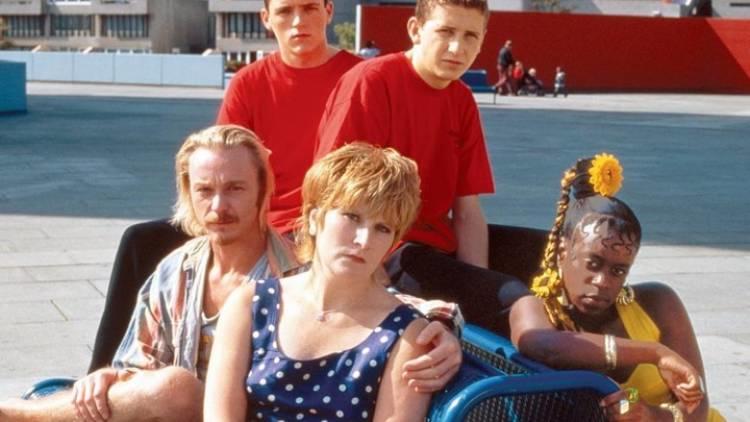
Known and loved by its audience for its soundtrack, which is mostly the work of Mama Cass, 'Beautiful Thing' wasn't intended for cinematic release. The almost universal acclaim it received when it was shown on Channel 4 changed that, and it made its way into cinemas, where audiences were enthralled by the gritty tale of gay love on a poverty-stricken British council estate. It might be yet another coming-of-age drama, but it's one that's created with well-written and relatable characters who deal with their issues in believable ways.
We have a significant number of coming-out and coming-of-age dramas on this list, but none that deal with it from the point of view of an African-American, where homosexuality is perhaps frowned upon more than it is elsewhere in Western society. 'Moonlight' is a film that fills that space. The film is a labor of love from author Tarell Alvin McCraney; his autobiographical book was rejected by publishers, so he turned it into a play, and it was finally taken to the movies by director Barry Jenkins.
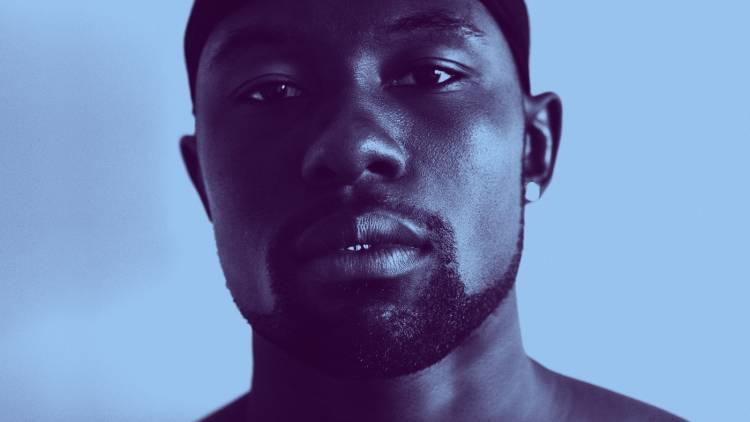
'Moonlight' follows its central character across his youthful formative experiences, starting out as a child and then progressing into adolescence and young adulthood, coping with the realization that he's gay and trying to work out how to handle that in the context of the rough Miami district he lives in. It resonated strongly with audiences, and finally brought McCraney vindication; he and Jenkins jointly won the 'Best Adapted Screenplay' Oscar for their work, with 'Moonlight' winning 'Best Picture' overall.
Perhaps best described as a gay take on 'Pride and Prejudice,' 2017's 'Call Me by Your Name' manages to tackle the issues of class discrimination and sexuality at the same time. The task of making it all worked is handled with aplomb by Elio Perlman and Armie Hammer in the leading roles as a young male couple falling in love despite themselves and their differences. 'Call Me by Your Name' won the 2018 Oscar for 'Best Adapted Screenplay.'
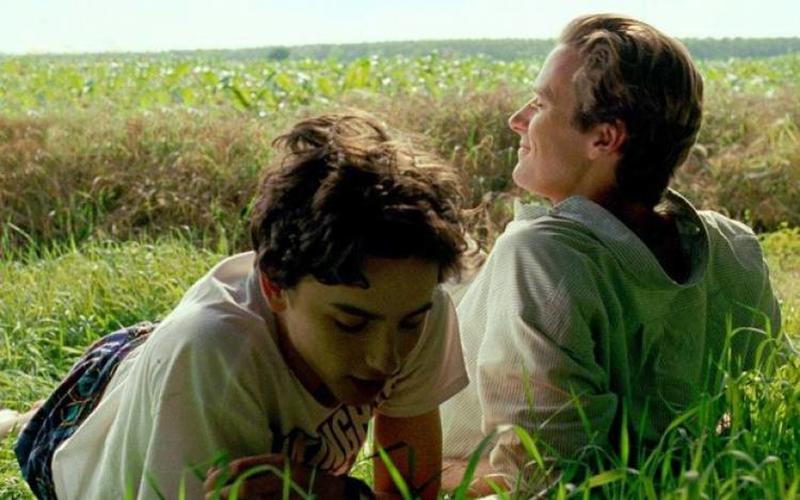
The crux of the story is one of an impressionable but closeted 17-year-old boy finding himself irritated by the arrival of a 24-year-old Jewish-American student, invited to come and live with his family for a while by his father, who is a university professor. The young and studious Elio feels that the boisterous and outspoken visitor has nothing in common with him, but nevertheless finds himself strangely drawn to him, and begins to question both his orientation and his beliefs.
Not every successful gay movie receives Oscar wins or Oscar nominations, but you can judge how well it was received by the LGBT community by the number of accolades they award it themselves. 2007's 'Shelter' won 'Outstanding Limited Release Film' at 2009's GLAAD Media Awards, along with 'Favorite Narrative Feature' and 'Best New Director' at Seattle's Lesbian & Gay Film Festival. On top of that, it was the people's choice winner for 'Best Feature' at the Vancouver Queer Film Festival. The gay community really loves this movie.
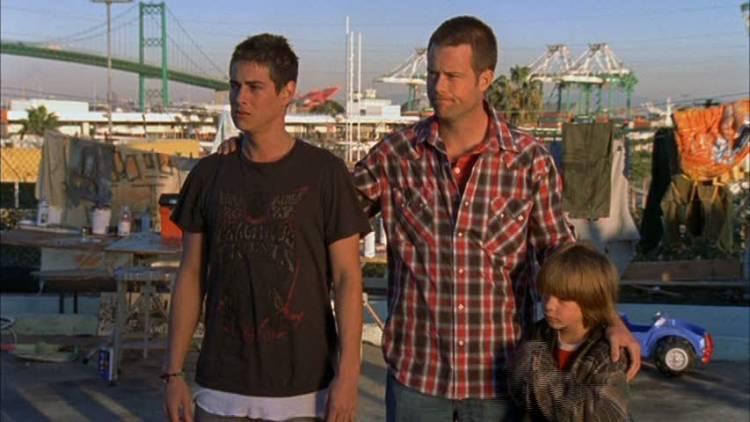
The movie is a complicated tale, tackling the complexities of coming out inside a family that's been wracked by tragedy, and in which the custody of a small child is at question. Powerful and dramatic, the plot twists, turns and pulls on the heartstrings. Viewers find themselves desperately hoping for a happy ending but can't be sure they're going to get it until the final moments.
You likely didn't expect to see any movie in the top spot other than this one. Very early on in the list, we mentioned that Ang Lee would never be more closely associated with any gay film than this one, and that's because it's the best-known and most successful gay themed movie of all time. Made in 2005, 'Brokeback Mountain' broke box barriers and box office records.
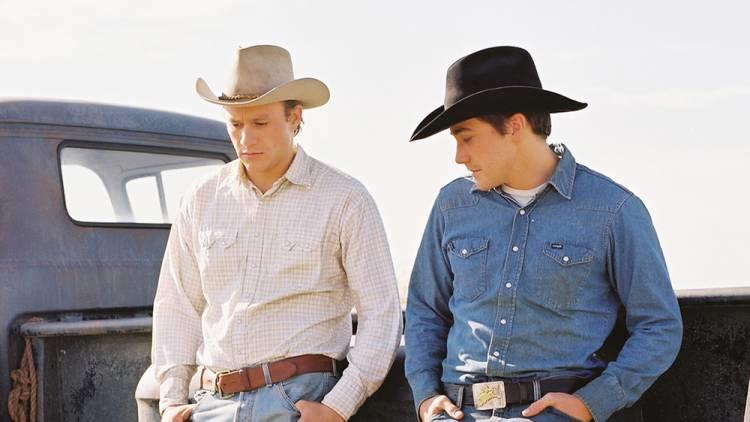
By now you're all probably familiar with the central tale of forbidden love between two rural ranchers, played to perfection by Heath Ledger and Jake Gyllenhaal, so we'll talk about the awards instead. 'Brokeback Mountain' won the Oscar for 'Best Director,' 'Best Adapted Screenplay' and 'Best Original Score,' missing out to 'Crash' for 'Best Picture' in what many critics considered to be a robbery. In 2018 it was chosen to be preserved in the United States National Film Registry on the grounds that it was 'culturally, historically or aesthetically significant.' It is, by some distance, the most recently-made movie to receive that honor.